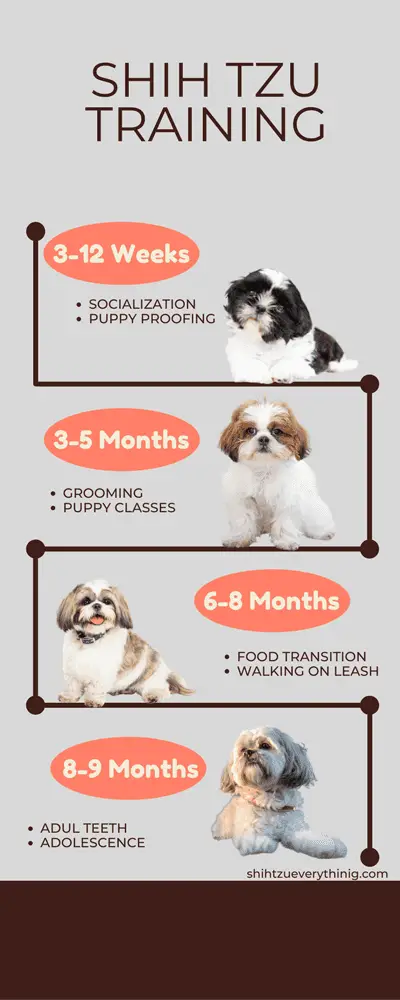
If you’ve recently welcomed a charming Shih Tzu into your home, you may be wondering when is the best time to start training them.
Well, fret not, because in this article, we’re going to answer the age-old question: “What age to start training a Shih Tzu?” Training a Shih Tzu can be a delightful and rewarding experience, but it’s important to know the right age to begin this journey.
So, let’s dive in and discover the ideal time to start shaping your furry friend into a well-behaved companion.
When it comes to training a Shih Tzu, it’s crucial to begin early. Puppies have a remarkable capacity for learning, and their brains are like sponges, ready to soak up all the knowledge you can provide.
Starting training at a young age, around 8 to 12 weeks old, is recommended. This is when their cognitive abilities are developing rapidly, and they are more receptive to new experiences and commands. By starting early, you can establish a strong foundation for obedience and good behavior, setting your Shih Tzu up for a lifetime of success.
So, let’s explore the exciting world of Shih Tzu training and discover the wonders that await you and your furry companion!
When it comes to training a Shih Tzu , it's important to start early. The ideal age to begin training is between 8 and 12 weeks old. This is when puppies are most receptive to learning and can easily pick up new commands and behaviors. Starting early ensures that your Shih Tzu develops good habits and becomes a well-behaved companion. Remember to use positive reinforcement techniques, such as treats and praise, to motivate and reward your furry friend during training sessions.
What Age to Start Training a Shih Tzu?
Training a Shih Tzu is an important part of their development and overall well-being. It helps them become well-behaved, obedient, and socialized dogs.
But when is the right age to start training a Shih Tzu? In this article, we will explore the optimal age to begin training your adorable furry friend and provide you with some helpful tips to make the process effective and enjoyable.
Starting Early: The Best Approach

When it comes to training a Shih Tzu, it is best to start early. Ideally, you should begin training your Shih Tzu as soon as you bring them home, which is usually around 8 to 12 weeks of age.
This is a critical period in their development where they are most receptive to learning and forming habits. By starting early, you can establish a strong foundation for their training and set them up for success in the long run.
During the early stages of training, focus on basic commands such as sit, stay, come, and potty training. Use positive reinforcement techniques such as treats, praise, and rewards to encourage good behavior.
Keep training sessions short and frequent, as young Shih Tzus have shorter attention spans. Remember to be patient and consistent, as it may take time for them to fully grasp and respond to your commands.
The Adolescent Stage: Building on the Foundation
As your Shih Tzu grows older, they will enter the adolescent stage, which typically occurs between 6 and 18 months of age.
During this phase, they may become more independent and test boundaries. It is important to continue their training during this time to reinforce good behavior and prevent any undesirable habits from forming.
In addition to the basic commands, you can introduce more advanced training exercises such as leash training, heel, and tricks. Consider enrolling your Shih Tzu in obedience classes or working with a professional trainer to enhance their skills and ensure they receive proper socialization with other dogs.
Benefits of Early Training
Starting training early has numerous benefits for both you and your Shih Tzu. Firstly, it establishes a strong bond between you and your furry companion. Training sessions provide opportunities for quality time and interaction, strengthening your relationship. Secondly, early training sets the groundwork for good behavior, making it easier to manage your Shih Tzu’s behavior as they grow older. It also helps prevent common behavior problems such as excessive barking, chewing, and aggression.
Tips for Successful Training
Here are some tips to make the training process more successful and enjoyable for both you and your Shih Tzu:
1. Be patient and consistent: Training takes time and effort. Stay consistent with your commands and expectations.
2. Use positive reinforcement: Reward good behavior with treats, praise, and affection to motivate your Shih Tzu.
3. Keep training sessions short and fun: Shih Tzus have short attention spans, so keep training sessions brief and engaging.
4. Socialize your Shih Tzu: Introduce them to different environments, people, and other animals to promote their social skills.
5. Seek professional help if needed: If you’re struggling with training or have specific concerns, consult a professional dog trainer for guidance.
In conclusion, the best age to start training a Shih Tzu is as early as possible, ideally around 8 to 12 weeks of age. This allows you to establish a strong foundation and set them up for a lifetime of good behavior. Remember to be patient, consistent, and use positive reinforcement techniques. With proper training and socialization, your Shih Tzu will grow into a well-behaved and happy companion.
Key Takeaways – What Age to Start Training a Shih Tzu?
- Start training your Shih Tzu as early as 8 to 10 weeks old.
- Begin with basic commands like sit, stay, and come.
- Use positive reinforcement techniques such as treats and praise.
- Keep training sessions short and fun, around 5 to 10 minutes.
- Be patient and consistent with your training efforts.
Frequently Asked Questions

When should I start training my Shih Tzu?
Training is an essential part of a Shih Tzu’s development, and it’s best to start as early as possible. The ideal age to begin training a Shih Tzu is around 8 to 12 weeks old. At this age, they are more receptive to learning and can easily adapt to new commands and routines. Starting early also helps establish a strong foundation for their behavior and obedience.
However, it’s important to keep in mind that training should be done in a gentle and positive manner. Shih Tzus are sensitive dogs, and harsh or forceful training methods can be counterproductive. Patience, consistency, and rewards-based training techniques work best with this breed. Remember, every Shih Tzu is different, so adjust your training approach based on your pup’s individual needs and personality.
What are some basic commands to teach my Shih Tzu?
Teaching your Shih Tzu basic commands is an important part of their training. Here are a few commands you can start with:
1. Sit: This command teaches your Shih Tzu to sit down on command. Use treats and praise to reward them when they successfully sit.
2. Stay: Teaching your Shih Tzu to stay in one place until given permission is crucial for their safety. Start by asking them to stay for a short duration and gradually increase the time.
3. Come: This command is essential for recall and should be taught in a safe, enclosed area. Use treats and positive reinforcement to encourage your Shih Tzu to come to you when called.
Remember, consistency is key when training your Shih Tzu. Short, frequent training sessions are more effective than long ones, and always end each session on a positive note.
Can an older Shih Tzu be trained?
While it’s generally easier to train a Shih Tzu when they are young, older dogs can also be trained with patience and consistency.
The key is to understand that older dogs may have established habits and behaviors, so it may take more time and effort to modify their behavior.
When training an older Shih Tzu, it’s important to start with basic commands and gradually move on to more advanced training.
Use positive reinforcement, such as treats and praise, to motivate and reward your dog for good behavior. Remember to be patient and understanding, as it may take some time for your older Shih Tzu to adapt to new routines and commands.
What are some tips for successful Shih Tzu training?
Training a Shih Tzu can be a rewarding experience for both you and your dog. Here are some tips to ensure successful training:
1. Be patient: Shih Tzus are sensitive dogs, and it may take time for them to understand and respond to your commands. Stay calm and patient throughout the training process.
2. Use positive reinforcement: Reward your Shih Tzu with treats, praise, and petting when they exhibit the desired behavior. Positive reinforcement helps motivate and reinforce good behavior.
3. Keep training sessions short and frequent: Shih Tzus have shorter attention spans, so it’s important to keep training sessions short and engaging. Aim for multiple short sessions throughout the day rather than one long session.
4. Be consistent: Consistency is key when training a Shih Tzu. Use the same commands, gestures, and rewards each time to avoid confusion and reinforce learning.
What if my Shih Tzu is not responding to training?
If your Shih Tzu is not responding to training, it’s important to evaluate your training methods and approach. Here are a few possible reasons why your Shih Tzu may not be responding:
1. Inconsistent training: If your training methods or commands are inconsistent, it can confuse your Shih Tzu. Make sure you are using the same commands and rewards consistently.
2. Lack of motivation: Every dog is different, and what motivates one Shih Tzu may not work for another. Experiment with different types of rewards, such as treats, toys, or praise, to find what motivates your dog.
3. Distractions: Shih Tzus can easily get distracted, especially during training sessions. Make sure you are in a quiet and distraction-free environment to enhance focus and concentration.
If you’re still facing challenges, consider seeking professional help from a certified dog trainer who specializes in positive reinforcement training methods. They can assess the situation and provide tailored guidance to help you and your Shih Tzu succeed in training.
How to Train Your Shih Tzu | Best Shih Tzu Puppy Training Tips
Final Summary: When to Start Training Your Shih Tzu
So, what age should you start training your Shih Tzu? After diving into the topic, it’s clear that the optimal time to begin training your furry friend is during their puppyhood, ideally around 8 to 12 weeks of age.
This is a critical period for their development, as they are more receptive to learning and forming positive associations.
By starting early, you can set a solid foundation for their behavior and instill good habits that will last a lifetime.
During this phase, it’s important to focus on basic commands such as sit, stay, and come. Consistency is key, so make sure to set aside regular training sessions and keep them short and engaging.
Use positive reinforcement techniques like treats, praise, and play to motivate your Shih Tzu and make the learning experience enjoyable. Remember, patience and persistence are crucial when training your furry companion.
As your Shih Tzu grows older, you can gradually introduce more advanced training techniques and tricks. However, it’s important to tailor the training to your dog’s individual personality and learning style.
Some Shih Tzus may be more stubborn or independent, requiring extra patience and creativity in your training approach. Always remember to keep the sessions fun, rewarding, and filled with love and encouragement.
In conclusion, starting training your Shih Tzu at a young age is essential for their development and well-being.
By investing time and effort into their training during their puppyhood, you can shape them into well-behaved and obedient companions. So, grab those treats, put on your training hat, and embark on this exciting journey with your adorable Shih Tzu!


